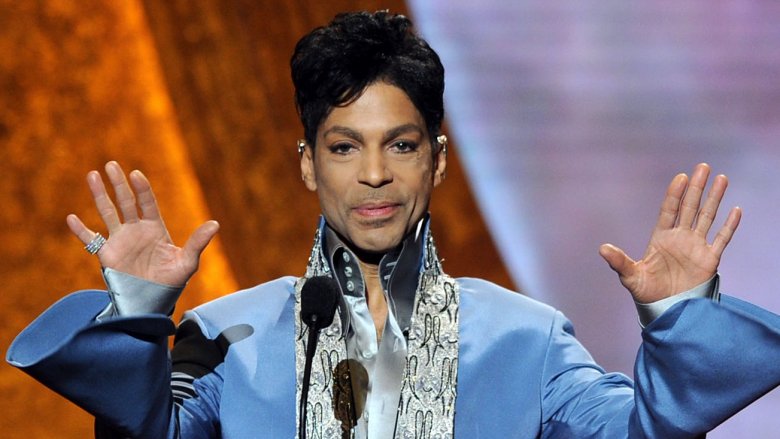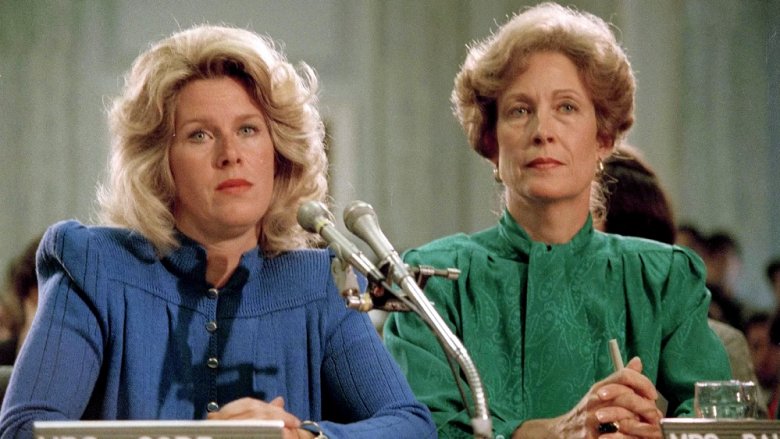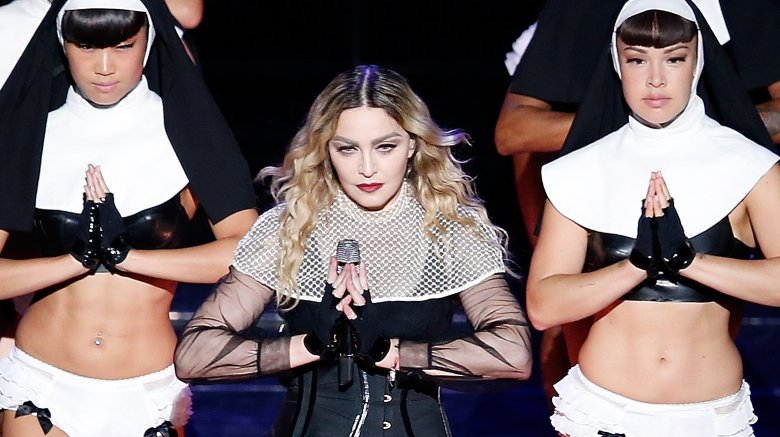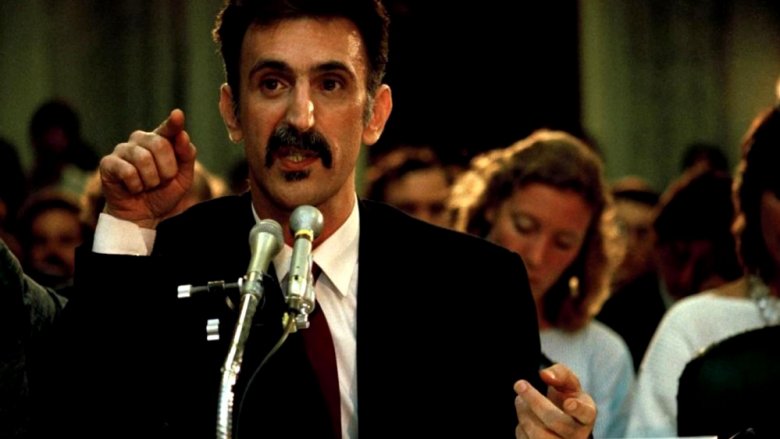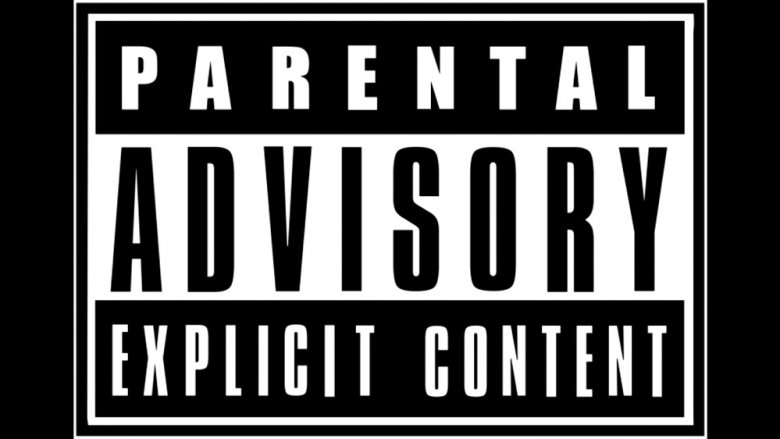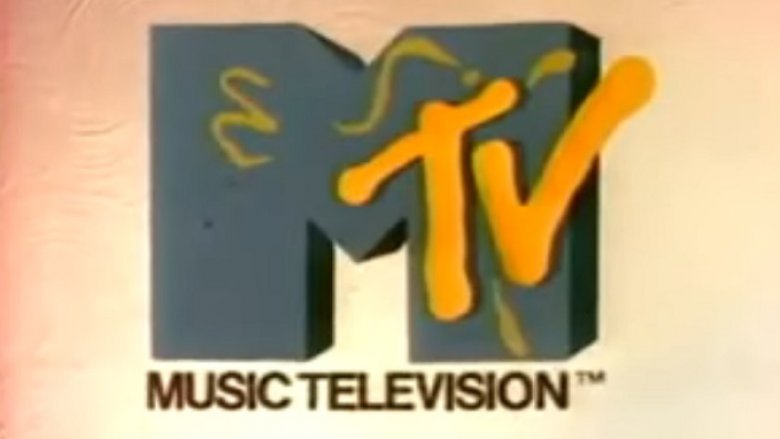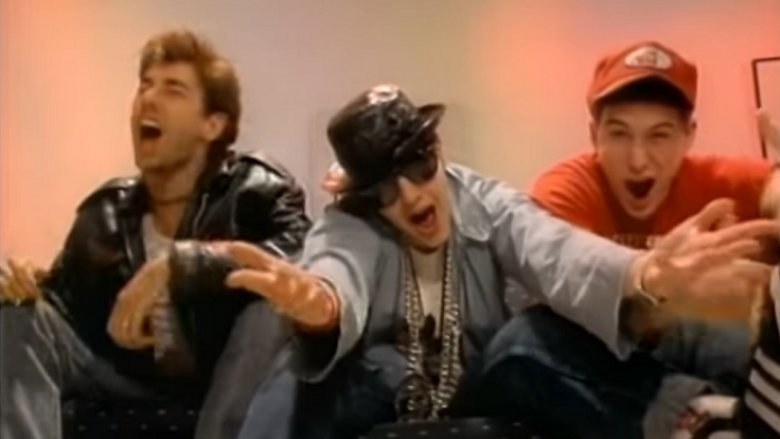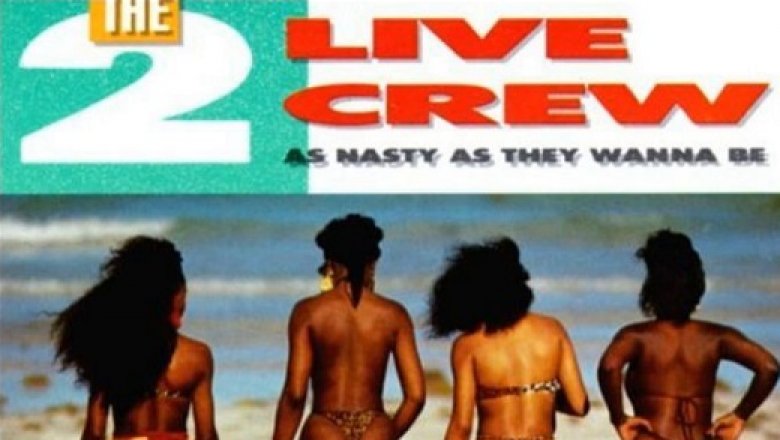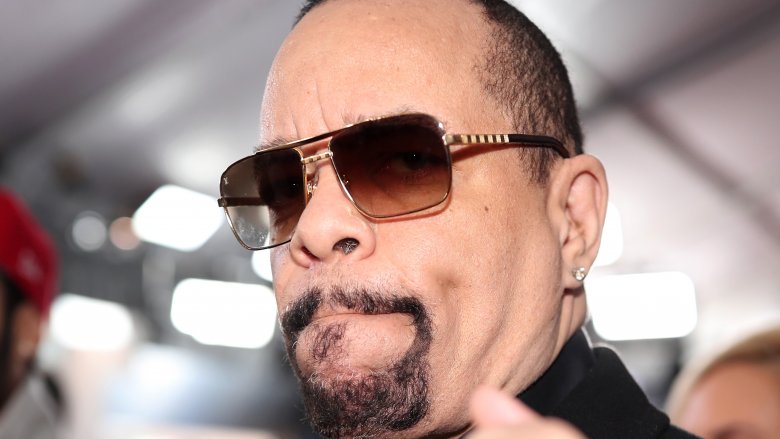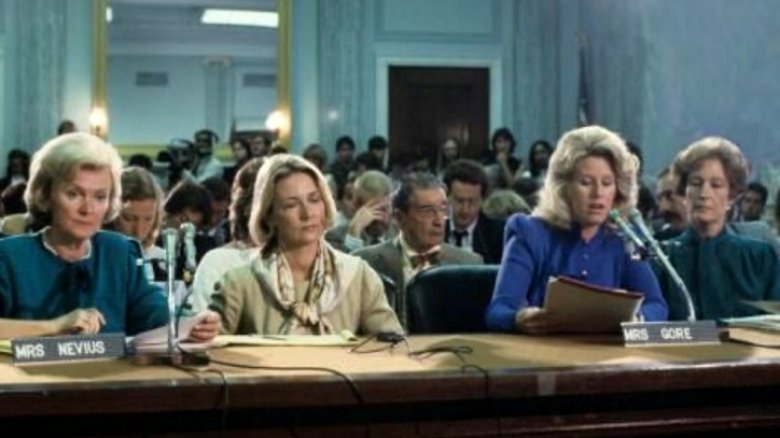That Time The Government Went To War With Music
The 1980s were a strange time, and for many who grew up in the '50s and '60s, they were weird and scary. Teens were flocking to theaters to see their peers get hacked to bits by silent, mask-wearing madmen, women and queer folks were starting to (gasp!) demand rights, and the kids were all freaking out over some bizarre new board game-type thing which was obviously a tool of Satan meant to coax them straight to hell. It seemed as though the moral fabric of the country was falling apart right before their straight-laced, Pat Boone-loving faces. (It wasn't, but it sure seemed like it.)
But for a few brief years, the attention of the old, clueless powers-that-be zeroed in with laser focus on the single biggest threat to the moral character of American youth: dirty lyrics in popular music. Unsurprisingly, the kerfuffle began over heavy metal, before rap helpfully popped up in the mid-'80s, allowing these moral crusaders to plop a vaguely racist cherry on top of their Panic Sundae. Before it was all over, artists had been thrown in jail, at least one album had been banned from sale, and a framework for institutional censorship had been established that carries repercussions to this day. Oh, and we got some pretty killer anti-establishment music out of the deal, too.
'Backmasking' and the Satanic Panic
The first few notes of this symphony of ridiculousness were played on April 27, 1982, when self-described neuroscientist William H. Yarroll II sat down in front of the California Assembly's Consumer Protection and Toxics Committee to describe how rock bands were inserting subliminal Satanic messages into their music via "backmasking," the practice of recording a phrase backward before inserting it into the finished recording. For proof, he played Led Zeppelin's "Stairway to Heaven" backward to reveal such phrases as "the Lord turns me off" and "here's to my sweet Satan"; an impressionable teen need only listen to such a message three times, he said, before it was "stored as truth."
Now, to be sure, musicians had been slipping backmasked phrases into their songs — usually cheeky in-jokes — since the days of the Beatles, with the backward speech being obvious. But Yarroll's implication was that normal, forward speech was producing a different message when played backward, which ... well, is nearly impossible to accomplish, not to mention that the whole idea of your brain picking up on a "backmasked" message is wildly unscientific. Artists responded to the controversy with mild bemusement and mocking backmasked messages, but a small if ridiculous inroad had been made to government intrusion in the content of music — and that inroad would be widened considerably just a few years later, all because one uptight woman heard a Prince song.
The PMRC
In 1984, like everyone else, Tipper Gore — the wife of Senator and future Vice President Al Gore — picked up a copy of Prince's Purple Rain. It wasn't because she had a sudden urge to get funky, but because she had an 11-year old daughter, and it was what the kids were listening to. (Because it was awesome.) But as they listened together, Tipper's wig performed a slow-motion flip as the Purple One crooned the lyrics to "Darling Nikki": "I knew a girl named Nikki, I guess you could say she was a sex fiend / I met her in a hotel lobby masturbating with a magazine."
"The vulgar lyrics embarrassed both of us," Tipper would later recount. "At first, I was stunned, but then I got mad! Millions of Americans were buying Purple Rain with no idea what to expect." Since Tipper was apparently the only person in America who had never heard of Prince before, she brought her startling, filthy discovery to a number of other wives of prominent Washington politicians and businessmen, and these women — who would come to cleverly be dubbed the "Washington Wives" — decided to dadgum do something about it. The Parents' Music Resource Center, or PMRC, was born — and since its members were all quite politically connected, they could do a lot more than stomp their feet and wag their fingers.
The Filthy Fifteen
The PMRC wasted no time scouring the entirety of current popular music for lyrics it could deem offensive, and if you're picturing a group of straight-laced middle-aged ladies fervently listening to Motley Crue and Judas Priest while clutching their pearls, well, we can't stop you. By early 1985, they had come up with a list they called the "Filthy Fifteen," complete with suggested "ratings" to let parents know exactly what kind of filth was being discussed here. And if you want to listen to them all, they are "Dress You Up" by Madonna, "She Bop" by Cyndi Lauper, "Let Me Put My Love Into You" by AC/DC, "(Animal) F**** Like a Beast" by W.A.S.P., "Sugar Walls" by Sheena Easton (which, incidentally, Prince wrote and produced), "Into the Coven" by Mercyful Fate, "We're Not Gonna Take It" by Twisted Sister, "Strap On Robby Baby" by Vanity, "Eat Me Alive" by Judas Priest, "Trashed" by Black Sabbath, "In My House" by Mary Jane Girls, "Possessed" by Venom, "High 'N Dry" by Def Leppard, "Bastard" by Motley Crue, and of course, "Darling Nikki."
The PMRC's proposed rating system — "X" for sexual content, "V" for violence, "D/A" for drug and alcohol references, and "O" for occult references — bore at least a surface similarity to the rating system employed for movies by the MPAA. But before long, it would morph into something else, and the PMRC would pull out all the stops to ensure that "offensive" music wouldn't go unlabeled.
The unlikliest artists testified before Congress ... and killed it
In 1985, the PMRC managed to get a Senate subcommittee convened to examine the issue of explicit lyrics. Along with a slew of legislators, an unlikely trio of musicians was invited to testify on behalf of artists everywhere: Twisted Sister front man Dee Snider, folk-rock crooner John Denver, and musical genius and famous weirdo Frank Zappa. By this time, the Recording Industry Association of America had already agreed in principle to label "offensive" releases — a development Snider would later note made the hearings themselves moot and possibly unconstitutional. It's unclear on what basis these particular three were chosen, but it is safe to say that in picking them, the PMRC bit off a bit more than it could chew.
Snider chastised the panel for misinterpreting the lyrics to his song "Under the Blade," in which Tipper Gore heard an explicit bondage message that didn't exist in a song about a band member's throat operation. ("I can't help it if Ms. Gore has a dirty mind," Snider declared, drawing daggers from Al.) John Denver — who Senators may have been expecting to be sympathetic — likened the hearings to Hitler's book burnings. But Zappa dropped the biggest, most eloquent burns: "The PMRC proposal is an ill-conceived piece of nonsense which ... infringes [on] civil liberties ... and promises to keep the courts busy for years," he said. "First Amendment issues are decided with a preference for the least restrictive alternative. In this context, the PMRC's demands are the equivalent of treating dandruff by decapitation."
The Parental Advisory sticker
As previously mentioned, it only took the mere threat of Senate hearings for the RIAA to cave, and by the time said hearings were in full swing, the PMRC had moved on from its previous proposal of content-specific ratings. In the middle of the hearings, Tipper Gore dropped this bomb: "We now propose one generic warning label to inform consumers in the marketplace about lyric content. We have asked the record companies to voluntarily label their own products and assume responsibility for making those judgments."
Within weeks (and despite loud protests from artists that such a blanket label would damage their sales), the RIAA nodded stupidly in agreement, and the "Parental Advisory — Explicit Content" label was born. Various designs were experimented with until the familiar, stark black-and-white design which probably adorned half of your favorite records in the 1990s was settled upon. Although the label was applied at the discretion of the RIAA, there was nothing to stop individual retailers from applying it of their own accord, which opened the door to willy-nilly stickering of any release that even vaguely looked like it might contain trace amounts of teen corruption. Case in point: Zappa's 1986 release Jazz From Hell got an "Explicit Lyrics" label from one retailer, despite the fact that the album is entirely instrumental. But of course, the fight over labeling was only one battle, not the whole war, and the PMRC was far from done.
MTV was caught in the middle
All of this was happening smack in the middle of MTV's ascent to domination of the pop culture landscape, and the suits couldn't help but notice that several of the artists on the PMRC's hit list happened to be some of their biggest stars. Initially, perhaps feeling safe because no Washington D.C. cable systems were yet carrying the network, MTV adopted a "wait and see" stance — but after the Senate hearings, the PMRC began to apply slow, steady pressure to the network to tighten broadcast standards which MTV insisted were already stringent enough.
Not keen to bite the hands that provided lots of kickass music videos, MTV rejected the PMRC's proposal to cluster offensive clips together late at night and maintained a public stance of non-interference in its artists' content. But the thing about slow, steady pressure is that it can work really well. With the advent of gangsta rap and bump-and-grind R&B in the late '80s, MTV began finding more and more reasons to edit out objectionable content, and the change happened so slowly that barely anyone (except, quite possibly, the artists) noticed. In 1984, MTV was bleeping or otherwise editing one of every ten videos it broadcast; a decade later, that number had gone up to one in three.
Musicians got arrested for performing live
The PMRC's victories were emboldening enough for some conservative leaning areas to pass ordinances governing the type of music that could be performed live, and no town was more zealous in its enforcement of its so-called "anti-lewdness" ordinance than Columbus, Georgia. It was passed in 1987, three weeks after a Beastie Boys concert that was typical of the band at the time, with scantily clad women gyrating in cages as they performed. Under the ordinance, no acts were actually banned from playing — that would be un-American. They just couldn't say any naughty words or do or say anything remotely suggestive, under the threat of arrest.
R&B loverman Bobby Brown and rap loverman LL Cool J were both arrested for "simulating sex acts" onstage during their Columbus appearances, and Gene Simmons of KISS and rapper Too $hort were slapped with misdemeanors. Ice-T, who doesn't get nearly enough credit for always being the most sensible man in any room he's in, simply canceled his planned Columbus show rather than deal with the hassle. Other local promoters from Toronto to Florida began to warn artists in advance about their onstage conduct and even monitored performances, with one Fort Lauderdale promoter lamenting that "they're going after rock groups wherever locals see the devil hiding." It wasn't long before his state would become the final, insane battleground in what had become an all-out war.
It was illegal to sell a certain album in some states
In 1988, N.W.A famously caught the attention of the FBI, which drafted a strongly worded letter to the group's distributors over their merry tune "F**** Tha Police." This largely blew over, but two years later, the one record specifically engineered to draw the ire of anyone sympathetic to the PMRC's cause was released — Florida rap act 2 Live Crew's As Nasty as They Wanna Be. (If you're wondering just how nasty they wanted to be, the answer is "very.") The group's eye-wateringly vulgar lyrics were too simplistic to be mistaken for anything else, and after fielding several alleged complaints about the record's presence in Florida retail outlets, crusading Broward County Sheriff Nick Navarro decided enough was enough. He threw down his hat, stomped on it, and obtained a court order declaring the record obscene — meaning retailers who carried it could be in violation of the law.
This prompted a lawsuit from the band alleging a different kind of violation — of their First Amendment rights. But in an astonishing decision, U.S. District Judge Jose Gonzalez upheld the court order in June 1990, and three days after the ruling, 2 Live Crew was arrested and charged with obscenity following a performance at a club. They were eventually acquitted at trial, and Gonzalez' ruling was overturned — but for several months, As Nasty As They Wanna Be was effectively illegal to sell or perform in many parts of the country.
Artists simply weren't having it
If rock and rap ever had one thing in common, it was severe disdain for square authority — so as expected, the musical backlash to the hostile new environment created by the PMRC and local authorities was swift and merciless. Artists from Warrant (whose "Ode to Tipper Gore" is simply a pastiche of obscenities) to Danzig (whose hit song "Mother" is a direct assault on the PMRC) weighed in with their music; punk band NoFX chose to just release an entire EP succinctly titled The PMRC Can Suck On This. Provocateurs extraordinaire Rage Against the Machine caused a stir by "performing" a 15-minute set at Lollapalooza standing in silence, naked, with duct tape over their mouths and the letters "PMRC" scrawled across their chests — but the biggest verbal beatdown of all came from Ice-T, on his tellingly titled 1989 release Freedom of Speech... Just Watch What You Say.
On the title track, Ice called out Tipper Gore by name, delicately suggesting that her husband the Senator was failing to please her in the bedroom and pointing out the weakness of any argument for censorship. But he reserved plenty of vitriol for Columbus, Georgia, likening it to a smear of feces on a map, before deadpanning "Once you take away my right to speak / Everybody in the world's up sh*t creek."
A legacy of censorship
In an interview with devil music promoters Rolling Stone thirty years after the infamous Senate hearings, Tipper Gore doubled down on censorship in the internet age, saying, "In this era of social media and online access, it seems quaint to think that parents can have control over what their children see and hear. But I think this conversation between parents and kids is as relevant today as it was back in the Eighties. Music is a universal language that crosses generations, race, religion, sex and more. ... All of the artists and record companies who still use the advisory label should be applauded for helping parents and kids have these conversations about lyrics around their own values."
Of course, barely anybody buys physical media anymore, but despite having disbanded in the late 1990s, PMRC's legacy of censorship lives on — particularly in the form of mega-retailer Walmart, which to this day won't stock any release carrying the Parental Advisory sticker. Tipper's War led to a now-decades-old specialty among recording engineers — the "art of the clean version" — and for MTV's part, they checked out of the whole debate in the early 1990s to abandon the "M" part of their network's name and focus solely on reality programming. Of course, some research has shown that such programming is far worse for impressionable young minds than dirty lyrics ever were — but the government doesn't seem to care about that, so it can't be too important.
